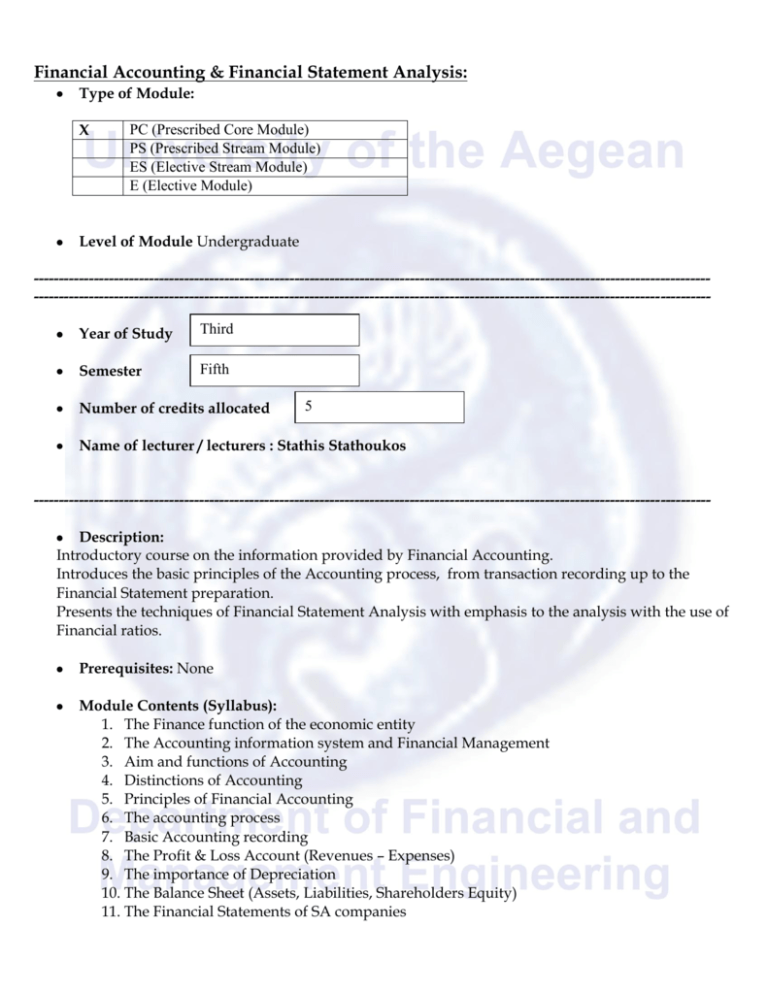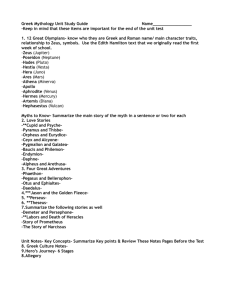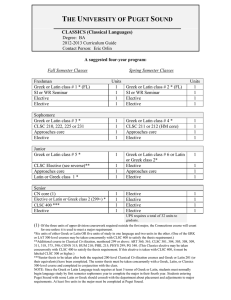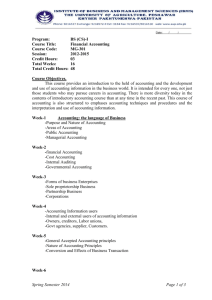Financial Accounting & Financial Statement Analysis:
advertisement

Financial Accounting & Financial Statement Analysis: Type of Module: X PC (Prescribed Core Module) PS (Prescribed Stream Module) ES (Elective Stream Module) E (Elective Module) Level of Module Undergraduate ----------------------------------------------------------------------------------------------------------------------------------------------------------------------------------------------------------------------------------------------------------------------------Year of Study Third Semester Fifth Number of credits allocated 5 Name of lecturer / lecturers : Stathis Stathoukos --------------------------------------------------------------------------------------------------------------------------------------Description: Introductory course on the information provided by Financial Accounting. Introduces the basic principles of the Accounting process, from transaction recording up to the Financial Statement preparation. Presents the techniques of Financial Statement Analysis with emphasis to the analysis with the use of Financial ratios. Prerequisites: None Module Contents (Syllabus): 1. The Finance function of the economic entity 2. The Accounting information system and Financial Management 3. Aim and functions of Accounting 4. Distinctions of Accounting 5. Principles of Financial Accounting 6. The accounting process 7. Basic Accounting recording 8. The Profit & Loss Account (Revenues – Expenses) 9. The importance of Depreciation 10. The Balance Sheet (Assets, Liabilities, Shareholders Equity) 11. The Financial Statements of SA companies 12. The Profit Appropriation Account 13. The Cash Flow Statements (Cash inflows – Cash outflows) 14. The Financial analysis techniques 15. Financial Statement analysis 16. Liquidity, Performance, Effectiveness analysis 17. Capital structure and Feasibility analysis. 18. Financial Ratios interpretation Recommended Reading: Α) Principal Reference: Konstantinos Kantzos, Financial Statement Analysis, 2002, Interbooks ed. (in Greek) Β) Additional References: 1. Papas A., Introduction to Financial Accounting, vol. A & B, 2005 & 2007, Benos ed. (in Greek) 2. Meigs W. & Meigs R., Accounting. The basis for Business Decisions, 1988, Papazissis ed. (in Greek) Teaching Methods: In class lectures, problems & case studies. Assessment Methods: Assignments during the course (10% of the total mark) and a final exam (90% του βαθμού) on the total course work. Language of Instruction: Greek Module Objective (preferably expressed in terms of learning outcomes and competences): To help the students in: - understanding the importance of the Accounting information - obtaining the basic skills on accounting recording and preparing the Financial Statements (Profit & Loss account, Balance Sheet, Profit Appropriation account) - obtaining the required skills in analyzing and interpreting Financial Statements as well as their application in decision making











